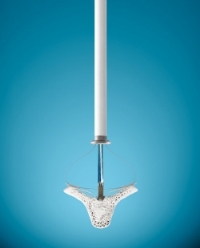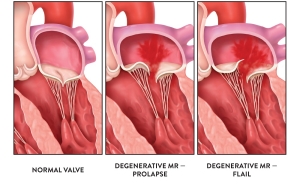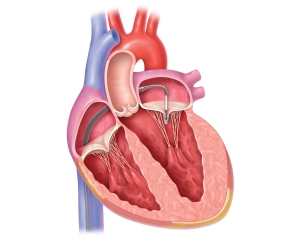MitraClip Therapy
A Minimally-Invasive Treatment for Mitral Valve Repair
 At Boulder Community Health, we use the latest technology and medical advancements
to help our patients get back to living their best life. That’s
why our full-service
cardiology program—the only one in Boulder County—takes an innovative approach
to heart health and is proud to add MitraClip® Therapy to our range
of heart disease treatments for patients suffering from mitral regurgitation.
At Boulder Community Health, we use the latest technology and medical advancements
to help our patients get back to living their best life. That’s
why our full-service
cardiology program—the only one in Boulder County—takes an innovative approach
to heart health and is proud to add MitraClip® Therapy to our range
of heart disease treatments for patients suffering from mitral regurgitation.
Our dedicated team of physicians, nurses, and technicians work together to effectively diagnose and treat your heart condition. MitraClip® Therapy is just another way physicians at BCH provide you with options for your heart health care needs. No matter how serious the condition, you’ll feel good knowing that our cardiologist-led care teams work with you every step of the way.
BCH cardiologist Dr. Srinivas lyengar has extensive experience performing MitraClip® Therapy for patients suffering from mitral regurgitation. Call Boulder Heart at 303-442-2395 to schedule an appointment for a screening today.
- What is Mitral Regurgitation?
- How Does MitraClip® Therapy Help?
- Who is a Candidate for MitraClip® Therapy?
- What to Expect Before, During and After the Procedure
What is Mitral Regurgitation?
Mitral regurgitation is a condition that occurs when the mitral valve in the heart fails to close properly, causing blood to flow backward into the left atrium. The mitral valve is one of four valves that function as passageways between the four chambers of the heart. As your heart beats thousands of times a day, dozens of gallons of blood are pumped through the heart’s chambers each hour and regulated by the valves.
 When the mitral valve functions improperly, blood which is supposed to
flow in one direction may flow backward, causing your left ventricle to
pump harder to keep the blood flowing. Over time, the strain of mitral
regurgitation can cause your heart to weaken and may lead to congestive
heart failure (CHF), a serious condition where your heart is unable to
pump enough blood for your body to function properly.
When the mitral valve functions improperly, blood which is supposed to
flow in one direction may flow backward, causing your left ventricle to
pump harder to keep the blood flowing. Over time, the strain of mitral
regurgitation can cause your heart to weaken and may lead to congestive
heart failure (CHF), a serious condition where your heart is unable to
pump enough blood for your body to function properly.
Mitral Regurgitation Affects Nearly 1 in 10 Americans Aged 75 and Older
Symptoms of mitral regurgitation include:
- Shortness of breath
- Fatigue
- Irregular heartbeat
- Persistent cough
One type of mitral regurgitation — degenerative mitral regurgitation — can be caused by the aging process, a birth defect, underlying heart disease, or a history of rheumatic fever. Moderate to severe degenerative mitral regurgitation can allow large amounts of blood to backflow in the heart. Additionally, when one also has symptoms of congestive heart failure or other heart ailments, the condition may be classified as significant, symptomatic, degenerative mitral regurgitation.
Treatments depend on the severity of the degenerative mitral regurgitation and may include prescribed medication. However, prescriptions generally only treat the symptoms and not the underlying problem with the mitral valve. This condition is generally treated only by mitral valve surgery (open-heart surgery) or transcatheter mitral valve repair (TMVr).
How Does MitraClip® Therapy Help?
MitraClip® Therapy works in conjunction with TMVr, which is a minimally invasive procedure used when a patient is too sick or has another medical condition prohibiting them from undergoing the traditional mitral valve surgery. This procedure doesn’t require opening the chest or stopping the heart during treatment, making it a safer alternative for those unfit for open heart surgery.
The MitraClip® NT device is a small, dime-sized clip used to close the center of the mitral valve. The clip is guided through a large vein in your leg to your heart via a steerable catheter, which delivers and implants the device on the mitral valve. Once MitraClip® is implanted, the mitral valve continues to open on either side of the clip, allowing blood to flow on both sides into the left ventricle and limiting any backflow of blood into the left atrium.
Patients with degenerative mitral regurgitation that were studied for one year after the MitraClip® procedure experienced reduced mitral regurgitation, with benefits such as:
- Improved heart function: Reducing mitral regurgitation decreases the burden on the heart, which leads to a reversal of heart enlargement and allows it to pump blood more efficiently.
- Improved symptoms: Patients experienced significant improvement in how they feel during physical activities.
- Fewer heart failure hospitalizations: There was a 73-percent reduction in hospitalizations for heart failure in the year following the procedure compared to the year prior.
- Improved quality of life: Patients experienced improvements in physical and mental function (measured by standardized quality of life survey).
Who is a Candidate for MitraClip® Therapy?
Candidacy for this procedure will be evaluated by your cardiologist, who will review your medical history and current state of health to ensure that MitraClip® Therapy is a safe and effective treatment for your needs. Certain qualifications must be met before undergoing the MitraClip® Therapy procedure. You will be thoroughly evaluated during your screening to determine if you qualify. However, there are certain conditions that make an individual unfit for this procedure.
Those who should NOT undergo MitraClip® Therapy for degenerative mitral regurgitation include individuals who:
- Currently suffer from an active infection or inflammation of the mitral valve
- Have a blood clot in the heart or vessels that carry blood from the lower body to the heart
If any of the above applies to you, your doctor will work with you to find the best solution to help with your degenerative mitral regurgitation.
What to Expect Before, During and After the Procedure
Before your procedure, it’s important to follow all preparations as outlined by your physician. You should also inform your doctor about all medications you’re currently taking and any allergies you may have. It’s vital that you take all prescribed medications given to you before your procedure and to follow all instructions from your doctors and nurses.
As you get ready for the procedure, you may have questions. The general outline for MitraClip® Therapy with TMVr is as follows:
- The procedure is generally performed in a specialized room at the hospital called a "Cath Lab."
- You’ll be placed in general anesthesia and a ventilator is used to help you breathe.
- Fluoroscopy (special x-ray) and echocardiography (type of ultrasound) are used to visualize your heart.
- The procedure generally takes 3-4 hours (may vary).
The procedure itself is generally performed as follows:
- A small incision is made in the upper leg and a guide catheter is inserted through your vein to reach the heart.
- The MitraClip® NT Device is attached at the end of a clip-delivery system that is guided to the mitral valve through the catheter. Your cardiologist uses imaging equipment to guide placement of the clip.
-
 Your cardiologist then implants the clip at the appropriate place in the
mitral valve. The clip grabs the mitral valve leaflets to close the center
of the valve to reduce mitral regurgitation.
Your cardiologist then implants the clip at the appropriate place in the
mitral valve. The clip grabs the mitral valve leaflets to close the center
of the valve to reduce mitral regurgitation.
- Your cardiologist then performs tests to confirm that the clip is working. In some cases, a second clip is inserted to help reduce mitral regurgitation.
- Once in place and working properly, the clip is released from the clip-delivery system. The clip-delivery system is removed from the body and the small incision is closed.
- The implanted clip becomes a permanent part of the heart, allowing the mitral valve to close more tightly and reduce the backward flow of blood.
After the procedure, your hospital stay may range from one to five days depending on the rate of recovery and your health. However, you should feel relief from your symptoms soon after the procedure is completed. During your recovery in the hospital, your physician will perform tests to evaluate your heart function. Blood-thinning medication may be given to you to reduce the risk of blood clot. Most patients who have MitraClip® Therapy don’t need special assistance at home post-procedure.
As with any medical procedure, it’s important to follow all instructions from your physician once you leave the hospital. Whether you’re discharged to your cardiologist or family practitioner, you must go to your follow-up appointments. Not going to follow-up visits may risk complications and increase the possibility of mitral regurgitation returning.
Please notify your physician immediately of any pain or problems related to the procedure or any return of symptoms. It’s best to limit strenuous physical activity (i.e. jogging, activities that require breath-holding, grunting, straining, or lifting heavy objects) for at least 30 days or possibly longer depending on your physician’s advice.
Call your physician if you have side-effects because of medications such as:
- Rash
- Bleeding
- Upset stomach
You should also call your physician before you have any unrelated medical procedures or dental work, as you may need to have antibiotics to avoid infection.
Make an Appointment Today
If you’d like to learn more about mitral regurgitation and if MitraClip®
Therapy is right for you, please call Dr. Iyengar today at
303-442-2395 to schedule an appointment for a screening.
-
Boulder Heart at Anderson Medical Center
4743 Arapahoe Avenue , Suite 201
Boulder, CO 80303
(303) 442-2395 More Information -
Boulder Heart at Community Medical Center
1000 W. South Boulder Road , Suite 216
Lafayette, CO 80026
(303) 442-2395 More Information -
Boulder Heart at Erie Medical Center
101 Erie Parkway , Suite 201
Erie, CO 80516
(303) 442-2395 More Information -
Boulder Heart at Longmont
2101 Ken Pratt Boulevard , Suite 104
Longmont, CO 80501
(303) 442-2395 More Information





